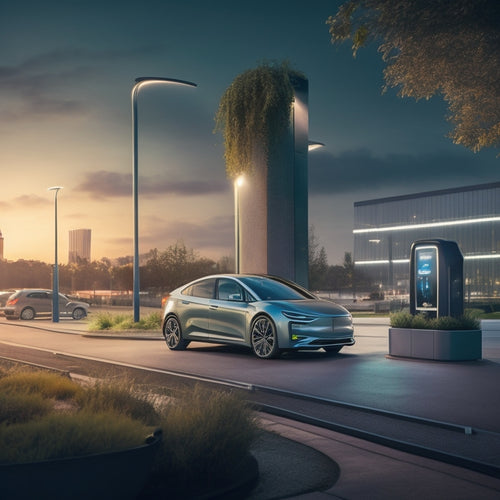
Small Solar Power System With Battery Storage
Share
You can install a small solar power system with battery storage to guarantee a reliable energy supply during outages, reducing your reliance on the grid and providing up to 70-80% less emissions output compared to traditional fossil fuels. This setup seamlessly switches to battery power when the grid fails, maintaining essential functions like refrigeration and lighting. By storing excess energy generated during the day, you can use it at night or during outages, reducing your energy bills and carbon footprint. As you investigate the world of small solar power systems, you'll uncover more benefits and ways to customize your energy independence.
The Essentials
- Small solar power systems provide reliable energy during outages through energy storage capabilities, ensuring critical appliances remain operational.
- Energy storage benefits include reduced energy bills, energy independence, and a consistent energy supply during outages and peak hours.
- Solar power systems significantly lower environmental impact by using sunlight, reducing reliance on fossil fuels and decreasing emissions output.
- Deep cycle batteries offer extended cycle life, reducing replacement frequency and maintenance needs, while storing excess energy for use during nighttime or outages.
- Proper sizing of solar power systems depends on understanding energy usage patterns, daily power requirements, and peak energy usage times to optimize energy generation strategies.
Reliable Energy During Outages
When the grid goes down, you'll still have power with a small solar power system, thanks to energy storage capabilities. This means you'll have a reliable source of energy during blackouts, keeping your essential appliances running.
With a reliable Home Power Backup System, you can rest assured that critical home systems, such as refrigeration and lighting, will continue to function smoothly, preventing food spoilage and maintaining safety.
Power During Blackouts
How do you keep the lights on when the grid goes dark? A small solar power system with battery storage is your answer to reliable energy during outages. With a solar backup, you'll have the power you need to stay safe and comfortable until the grid is restored.
A solar backup system provides blackout preparedness by storing excess energy generated by your solar panels during the day in a battery bank. When the grid goes down, your system can seamlessly switch to battery power, keeping your essential appliances running.
Here's a breakdown of how a solar backup system can benefit you during a blackout:
| System Component | Function | Benefit |
|---|---|---|
| Solar Panels | Generate energy during the day | Reduces reliance on grid power |
| Battery Bank | Stores excess energy | Provides power during blackouts |
| Inverter/Charge Controller | Manages energy flow | Guarantees safe and efficient energy distribution |
With a solar backup system, you'll have the freedom to stay powered up, even when the grid is down.
Energy Storage Benefits
Three key benefits of energy storage in a small solar power system are reliability, security, and independence during outages. With energy storage, you can enjoy uninterrupted power supply even when the grid goes down. This means you'll have reliable energy during outages, keeping your essential appliances running and your family safe.
Moreover, energy storage solutions can alleviate the burden of high energy bills and reduce grid dependence, providing users with greater energy independence and potential cost savings. Energy independence is another significant advantage of energy storage. You're no longer at the mercy of the grid, and you can generate and store your own clean energy. This gives you control over your energy usage and reduces your reliance on the utility company. You'll also experience cost savings as you'll be using stored energy during peak hours, reducing your energy bills.
Additionally, energy storage provides security against rising energy costs and unpredictable grid outages. You can store excess energy generated during the day and use it at night or during power outages, reducing your energy expenses.
With energy storage, you'll have peace of mind knowing you have a reliable source of energy, whenever you need it.
Low Carbon Footprint
You're likely drawn to small solar power systems because you want a green energy source that minimizes your environmental impact.
By utilizing sunlight, you're reducing your reliance on fossil fuels and lowering your emissions output.
In addition, adopting energy-efficient solutions can further reduce your energy consumption.
This shift to clean energy greatly shrinks your carbon footprint, contributing to a more sustainable future.
Green Energy Source
Solar energy is a green energy source that offers a low carbon footprint, making it an attractive alternative to traditional fossil fuels. When you invest in a small solar power system, you're not only reducing your reliance on the grid but also contributing to a cleaner environment.
Renewable technologies, like solar innovations, have made it possible to utilize the power of the sun and convert it into electricity. This means you're no longer dependent on non-renewable energy sources that harm the environment.
With a small solar power system, you can generate electricity on-site, reducing the need for transmission and distribution from power plants. This decentralized approach to energy production gives you more control over your energy usage and reduces your carbon footprint.
Reduced Emissions Output
Emissions reduction is a critical aspect of shifting to a sustainable energy future. By investing in a small solar power system with battery storage, you're taking a significant step towards minimizing your carbon footprint. This means reducing your reliance on fossil fuels, which are a major contributor to greenhouse gas emissions.
| Energy Source | Emission Reduction | Carbon Offset |
|---|---|---|
| Solar Power | 70-80% | 3-4 tons CO2/year |
| Wind Power | 60-70% | 2-3 tons CO2/year |
| Fossil Fuels | 0% | 10-12 tons CO2/year |
As shown in the table, solar power systems can reduce emissions by 70-80% compared to traditional fossil fuels. This translates to a carbon offset of 3-4 tons of CO2 per year, making it an attractive option for those seeking to minimize their environmental impact. By choosing a small solar power system with battery storage, you're not only reducing your emissions output but also contributing to a cleaner, healthier environment for future generations.
Deep Cycle Battery Benefits
You'll appreciate the advantages of deep cycle batteries in your small solar power system, particularly their extended cycle life, which reduces the frequency of replacements.
When it comes to home energy efficiency, deep cycle batteries are an excellent choice, as they can store excess energy generated by your solar panels during the day for use at night or during power outages.
This translates to cost savings over time, as you won't need to constantly purchase new batteries.
Additionally, deep cycle batteries require lower maintenance needs, freeing up your time for more important tasks.
Extended Cycle Life
Frequently, deep cycle batteries are chosen for small solar power systems because they offer an extended cycle life, which translates to a longer lifespan and reduced maintenance costs. This means you'll enjoy a longer period of reliable energy storage without frequent replacements.
With an extended cycle life, you can expect your deep cycle batteries to last for thousands of charge and discharge cycles, greatly reducing the need for premature replacements. This, in turn, leads to substantial cost savings and minimized waste.
To maximize battery longevity, it's crucial to follow proper maintenance tips. You should verify your batteries are charged correctly, avoiding undercharging or overcharging, which can reduce their lifespan.
Regularly checking the electrolyte levels, cleaning the terminals, and storing the batteries in a cool, dry place can also help prolong their life. By doing so, you'll be able to enjoy the full benefits of your deep cycle batteries, including a longer lifespan, reduced maintenance costs, and a reliable source of energy for your small solar power system.
Lower Maintenance Needs
Deep cycle batteries in small solar power systems require less upkeep due to their lower maintenance needs, a significant advantage that contributes to their popularity. This is because they're designed to handle the rigors of daily charging and discharging, making them more resilient than other battery types.
As a result, you'll spend less time and money on maintenance, which means more time enjoying the freedom that comes with off-grid energy independence.
To maintain system longevity, it's crucial to follow proper maintenance tips. Regularly check your battery's state of charge, voltage, and temperature to identify potential issues before they become major problems.
Keep your batteries clean and dry, and make certain they're securely fastened to prevent vibration damage. By following these simple maintenance tips, you'll be able to maximize your system's performance and extend its lifespan.
With deep cycle batteries, you can enjoy a reliable and efficient energy storage solution that requires minimal upkeep, giving you more time to focus on the things that matter most.
Assess Your Energy Demands
You need to understand your energy usage patterns to determine the size of the solar power system required for your needs.
Start by calculating your daily power requirements, considering factors like the number and type of appliances you'll be using, and how often you'll be relying on backup generators during outages. This will help you determine the total watt-hours of energy you need to generate each day.
Additionally, consider your energy usage patterns during peak hours and how a reliable home energy storage system can help you save energy. This will help you determine the total watt-hours of energy you need to generate each day.
Energy Usage Patterns
Your energy usage patterns play an essential role in determining the size and type of small solar power system you'll need. To accurately assess your energy demands, you must understand your daily energy usage habits. This involves identifying peak usage analysis and implementing energy conservation strategies to optimize your energy consumption.
| Time of Day | Energy Usage (Watts) | Energy Conservation Strategies |
|---|---|---|
| 6:00 AM - 8:00 AM | 500 | Turn off unnecessary lights and appliances |
| 12:00 PM - 2:00 PM | 1000 | Use energy-efficient appliances and lighting |
| 6:00 PM - 8:00 PM | 1200 | Implement smart home automation for energy management |
| 10:00 PM - 12:00 AM | 300 | Unplug chargers and turn off standby devices |
Daily Power Requirements
A typical day's energy demands are the foundation of sizing a small solar power system. To accurately determine your daily power requirements, you'll need to assess your energy consumption patterns.
Start by making a list of all your appliances, devices, and lighting systems that will be powered by your solar power system. Note their respective power ratings in watts (W) and the number of hours you expect to use them daily.
Next, calculate your total daily energy consumption in watt-hours (Wh) by multiplying the power rating of each device by its usage hours. For instance, if you have a 10W LED light that you'll use for 8 hours, its daily energy consumption would be 10W x 8h = 80Wh.
Perform this calculation for each device and add up the results to get your total daily energy consumption.
Accurate power calculations are essential in determining the right size of your solar power system and battery storage. By understanding your daily power requirements, you can confirm that your system can meet your energy demands, providing you with the freedom and independence you desire.
Higher Efficiency Inverter Technology
You're likely familiar with the importance of maximizing energy harvest in your small solar power system.
That's where higher efficiency inverter technology comes in, particularly when it comes to Maximum Power Point Tracking (MPPT).
Maximum Power Point Tracking
As the solar panel's output voltage fluctuates in response to changing environmental conditions, Maximum Power Point Tracking (MPPT) technology plays an essential role in optimizing energy harvesting. You'll find that MPPT technology is crucial for attaining the highest possible energy yield from your solar panel system. By continuously monitoring the solar panel's output voltage and current, MPPT technology adjusts the operating point to guarantee maximum power output.
MPPT technology can be especially beneficial in scenarios where environmental conditions are unpredictable or rapidly changing. For instance, on a partly cloudy day, the solar panel's output voltage may fluctuate considerably. Without MPPT technology, the energy yield would suffer. However, with MPPT, the system can adapt to these changes and maximize energy production.
Here's a summary of the benefits of MPPT technology:
| Feature | Benefit |
|---|---|
| Real-time monitoring | Optimizes energy harvesting in real-time |
| Dynamic adjustment | Adapts to changing environmental conditions |
| Maximum power output | Guarantees highest possible energy yield |
| Improved efficiency | Reduces energy losses and increases system efficiency |
| Flexibility | Suitable for various solar panel configurations and sizes |
Frequently Asked Questions
How Long Does It Take to Install a Small Solar Power System?
When you decide to go solar, you'll wonder how long the installation process takes. Typically, you'll spend 1-3 days on the installation timeline, depending on the complexity of the job and the crew's efficiency.
Can I Use a Small Solar Power System for My RV or Boat?
You're about to commence on a voyage of freedom, untethering from the grid. Yes, you can utilize the power of the sun for your RV or boat, with RV solar and boat solar systems designed to meet your off-grid escapades' energy needs.
Are Small Solar Power Systems Eligible for Government Incentives?
You're eligible for government incentives, including tax credits and state incentives, when installing a solar power system, as long as it meets specific requirements, such as being certified by a third-party organization like UL or IEEE.
Can I Expand My System if My Energy Needs Increase?
As you consider your growing energy needs, know that 75% of solar panel owners upgrade their systems within 5 years. You can expand your system with ease, incorporating system upgrades that prioritize energy efficiency, allowing you to utilize more power and maintain your independence.
Do Small Solar Power Systems Require Regular Maintenance?
You'll find that most systems, regardless of size, require regular maintenance to guarantee peak performance and system longevity. Typically, you'll need to inspect and clean panels, check electrical connections, and monitor battery health, with maintenance frequency depending on your system's specific needs.
Final Thoughts
As you weigh the pros and cons of a small solar power system with battery storage, remember that it's not just about going green - it's about staying powered during outages. While the environmental benefits are undeniable, the real breakthrough is the reliability and independence that comes with having your own energy source. By evaluating your energy demands and investing in high-efficiency inverter technology, you can enjoy the best of both worlds: a clear conscience and a fully charged battery when the grid fails.
Related Posts
-

Solid State Batteries in Electric Vehicles
Solid-state batteries revolutionize electric vehicles by offering a longer lifespan and higher energy density than tr...
-

Is This the Future of Alternative Energy Systems
Yes, alternative energy systems are shaping the future of energy. Innovations in solar and wind technologies are driv...
-

Solar Powered Lights for Sustainable Home Decor
Solar-powered lights offer a stylish and eco-friendly way to enhance your home decor. They capture sunlight, converti...


